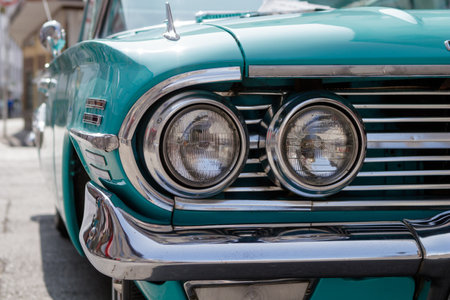Understanding Classic Car Status in the UK
Before you can insure a classic car in the UK, it is essential to determine whether your vehicle meets the legal definition of a ‘classic car’ as recognised by British authorities. The primary criteria are set by the Driver and Vehicle Licensing Agency (DVLA), which considers several factors. Generally, a car is classified as ‘classic’ if it is at least 15 to 40 years old, depending on the insurer and specific policies. However, for certain legal exemptions—such as Vehicle Excise Duty (road tax) or MOT requirements—the DVLA specifically recognises cars over 40 years old as historic vehicles.
Apart from age, historical value also plays a significant role. Vehicles must often possess unique design features, limited production numbers, or notable relevance to automotive history to qualify. Some insurers and collectors use terms like ‘vintage’, ‘antique’, or ‘historic’, but under UK law, the most robust benchmark is the DVLA’s official definition. It is crucial to check whether your car’s make, model, and year align with these definitions before seeking specialised insurance.
In summary, confirming your vehicle’s status as a classic according to UK law involves verifying its age, assessing its historical significance, and referencing DVLA guidance. Meeting these criteria not only ensures compliance but also unlocks access to tailored classic car insurance products and potential tax benefits.
2. Minimum Insurance Requirements
In the UK, classic car owners are legally obliged to have a minimum level of insurance before driving on public roads. The absolute minimum standard is Third Party Only (TPO) cover. This type of insurance is a legal requirement under the Road Traffic Act 1988 and protects against liability for injury or damage caused to other people, vehicles, or property while using your classic car. Importantly, TPO does not provide any financial protection for damage to your own vehicle or theft.
Understanding Third Party Only (TPO) Cover
| Insurance Type | What It Covers | What It Does Not Cover |
|---|---|---|
| Third Party Only (TPO) | Damage to other peoples vehicles Injury to other people Damage to third-party property |
Your own car’s damage Theft of your car Fire damage to your car |
Legal Implications
Driving without at least TPO insurance is illegal in the UK and can result in severe penalties, including fines, points on your licence, vehicle seizure, and even prosecution. Its important for classic car owners to ensure their policy meets this legal threshold at all times, even if the vehicle is rarely used.
SORN and Exemptions
If you do not plan to drive or park your classic car on public roads, you must register it as off the road with a Statutory Off Road Notification (SORN). Failing to insure a vehicle that is not declared SORN can still lead to penalties under Continuous Insurance Enforcement laws.

3. MOT and Roadworthiness Exemptions
When insuring a classic car in the UK, understanding MOT (Ministry of Transport) testing requirements is essential. Generally, vehicles over three years old must undergo an annual MOT test to ensure they are roadworthy and meet environmental standards. However, many classic cars benefit from exemptions under specific conditions. If your vehicle was first registered more than 40 years ago and has not undergone substantial changes to its technical characteristics—such as modifications to the chassis, engine, or suspension—it may qualify for an MOT exemption. Despite this, the legal responsibility for maintaining roadworthiness remains firmly with the owner.
It’s important to note that being exempt from MOT testing does not mean you can neglect regular maintenance. Insurers still require proof that your classic car is safe to drive, and you could be held liable if your vehicle is found unroadworthy during an accident or roadside check. The DVLA recommends keeping thorough records of all servicing, repairs, and checks. If your classic car is used for commercial purposes or has had significant alterations, it may not qualify for exemption and will need to pass annual MOTs as normal.
Failing to comply with these requirements can invalidate your insurance policy and result in prosecution. Therefore, always verify whether your classic car qualifies for MOT exemption before arranging insurance and stay proactive about regular safety checks. This approach ensures compliance with UK law and protects both your investment and personal liability.
4. Declaring SORN for Unused Classic Cars
If you own a classic car in the UK that is not currently being driven or kept on public roads, it is essential to declare a Statutory Off Road Notification (SORN). Failing to do so can result in legal penalties and unnecessary insurance or tax costs. The Driver and Vehicle Licensing Agency (DVLA) requires all vehicle owners to either insure their vehicles or officially declare them off the road.
When Should You Declare SORN?
A SORN should be declared if:
- Your classic car is not in use and is stored in a garage, driveway, or on private land.
- You do not intend to renew your vehicle tax or insurance because the car will not be driven.
- The vehicle is awaiting restoration or repair and will not be used on public highways.
How to Declare SORN
You can declare SORN online via the GOV.UK website, by phone, or by post. The process is straightforward, requiring your logbook (V5C) and reference number. Once processed, your vehicle is legally recognised as being off the road and you are exempt from paying vehicle tax and maintaining insurance for that period.
Legal Implications & Cost Considerations
| Scenario | Legal Requirement | Financial Impact |
|---|---|---|
| Not declaring SORN and no insurance/tax | Fined up to £1,000; risk of vehicle clamping/removal | Pays unused tax/insurance + fines |
| Declaring SORN correctly | No need for MOT, insurance, or tax while off-road | No ongoing running costs during non-use period |
| Using a SORN-declared vehicle on public roads | Illegal; subject to prosecution and fines | Pays court fines/possible seizure of vehicle |
Important Note:
SORN status must be renewed if ownership changes. If you decide to return the car to public roads, you must re-tax and insure it before use.
Summary: Stay Compliant & Save Costs
Declaring SORN is a legal necessity if your classic car will be unused and off public roads. It prevents fines, removes the obligation for insurance and tax during downtime, and helps manage ownership costs efficiently. Always update your SORN status promptly with any change in use or ownership.
5. Registering and Taxing Your Classic Car
Before you can insure your classic car in the UK, it is essential to ensure that the vehicle is correctly registered with the Driver and Vehicle Licensing Agency (DVLA). This process confirms your legal ownership and enables you to obtain a logbook (V5C), which is required by insurance companies. If your classic car has never been registered in the UK or has been off the road for a long period, you may need to complete a V55/5 form for used vehicles or a V55/4 form for new imports. Supporting documents typically include proof of identity, evidence of the vehicle’s age, and any previous registration paperwork.
Historic Vehicle Tax Exemptions
One significant advantage of owning a classic car in Britain is the potential eligibility for historic vehicle tax exemption. If your vehicle was built more than 40 years ago and has not been substantially modified within the last 30 years, it may qualify as a “historic vehicle.” In this case, you do not need to pay Vehicle Excise Duty (road tax), but you must still apply for a tax exemption each year through the DVLA. This process involves declaring your vehicle as “historic” on your V5C logbook and ensuring all documentation is up to date.
Statutory Off Road Notification (SORN)
If your classic car is not being driven or kept on public roads, you must declare it off-road by making a Statutory Off Road Notification (SORN) to the DVLA. This relieves you from paying tax and insurance while the vehicle is stored but still requires compliance before returning it to road use.
Cost Considerations
The cost for registering a classic car with the DVLA is generally modest—usually around £55 for first registration. However, ongoing costs can be minimised if your vehicle qualifies for historic status, as this waives annual road tax charges. Nevertheless, proper registration remains a non-negotiable step: failing to register or tax your classic car could result in fines and invalidate your insurance policy, undermining your legal compliance on UK roads.
6. Personalised Number Plates and Legal Display
When insuring a classic car in the UK, it is vital to understand the legal requirements concerning personalised number plates and their correct display. The Driver and Vehicle Licensing Agency (DVLA) has strict rules regarding registration numbers, which directly impact your vehicle’s compliance and insurance validity.
Regulations for Personalised Registration Plates
If you wish to assign a personalised or cherished number plate to your classic car, you must ensure that the registration mark is appropriate for the vehicle’s age. In the UK, it is illegal to make a car appear newer than it is by using a later registration mark. For example, placing a 2020-style plate on a 1970s classic would breach DVLA regulations and could invalidate your insurance.
Correct Plate Display Requirements
The law also specifies how number plates should be displayed: they must use the mandatory typeface, character size, spacing, and colour scheme (white at the front, yellow at the rear). Plates must be made from reflective material and not feature background patterns. Importantly, no bolts or screws should obscure any of the registration characters—failure to comply can result in fines and potential insurance complications if your car is involved in an incident.
Cost Implications and Insurance Considerations
Acquiring a personalised number plate usually involves additional DVLA fees, and there may be extra administrative costs when updating your insurance policy with new registration details. Insurers may also require proof that your cherished plate assignment complies with DVLA regulations before agreeing to provide cover for your classic car. Non-compliance could lead to rejected claims or policy cancellation, making it crucial to meet all legal standards when using personalised plates.


